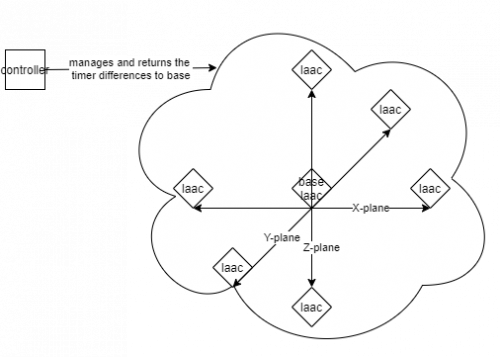So, For once, whenever you are flying near to moons, etc. you feel gravity, and you usually want to know which direction is up, maybe also your height or vertical velocity...
But how to calculate that, since acceleration or such, won't help.
Well, thanks to general relativity theory, there is a way to measure the gravity/gradient.
How?
By utilizing the time dilation that results from gravity bending time and space.
If accurate enough, you can place multiple clocks inside your ship, and the ones closer to the gravity well will go slower. A tiny bit.
So, add a central controller like the mcu for thruster to them, which knows all the laacs (ludicrously accurate atomic clock).
Which whil know the base laac, and the other laacs, and return timing speec difference or gravitiy time dilation difference between the base laac and the sattelite laacs.
Of course, the placement and configuration of those clocks will require some engineering work, if you want to easily evaluate their timing differences. As bigger distances yield more accurate results, and other placement choices will evaluation easier if not actually feasible.
So, Eos, and the sun would also issue those gradients (if calculated) but close to the moons, those should be dominant.
This is honestly the best I can think of to provide the player to detect upp/down without 'cheating' by simeply asking the engine where 'up' is.
Also, this might be expanded for titans as well, and should reach further than the notable gravity effects, even serving as an orientation inside belts.
And finally, IRL atom clocks can actually detect height differences of centimes on earth.
But how to calculate that, since acceleration or such, won't help.
Well, thanks to general relativity theory, there is a way to measure the gravity/gradient.
How?
By utilizing the time dilation that results from gravity bending time and space.
If accurate enough, you can place multiple clocks inside your ship, and the ones closer to the gravity well will go slower. A tiny bit.
So, add a central controller like the mcu for thruster to them, which knows all the laacs (ludicrously accurate atomic clock).
Which whil know the base laac, and the other laacs, and return timing speec difference or gravitiy time dilation difference between the base laac and the sattelite laacs.
Of course, the placement and configuration of those clocks will require some engineering work, if you want to easily evaluate their timing differences. As bigger distances yield more accurate results, and other placement choices will evaluation easier if not actually feasible.
So, Eos, and the sun would also issue those gradients (if calculated) but close to the moons, those should be dominant.
This is honestly the best I can think of to provide the player to detect upp/down without 'cheating' by simeply asking the engine where 'up' is.
Also, this might be expanded for titans as well, and should reach further than the notable gravity effects, even serving as an orientation inside belts.
And finally, IRL atom clocks can actually detect height differences of centimes on earth.
Attachments
-
28.1 KB Views: 132

